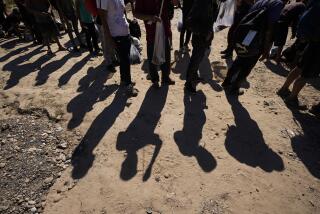Texas keeping most truck inspections despite border gridlock

- Share via
AUSTIN, Texas — Texas Gov. Greg Abbott on Wednesday defied mounting pressure to immediately end truck inspections that have gridlocked the U.S.-Mexico border for days, saying that despite miles-long backups and spoiled produce, he would not rescind his new order at all bridges until he gets more assurances of security.
The two-term Republican said he was only ending inspections at one international bridge after announcing what he described as an agreement for more enhanced security with Nuevo Leon Gov. Samuel García, whose Mexican state is across the border from Laredo.
But that would not bring relief to idling truckers stacked up elsewhere along Texas’ 1,200-mile border, including in cities where backups have lasted for more than 12 hours and frustrated truckers have blocked bridges in protest. That includes the Pharr-Reynosa International Bridge, which has been effectively closed since Monday by trucker protests.
Abbott said he hoped officials in the three other Mexican states that border Texas would follow Nuevo Leon and also promise more security.
“I understand the concerns that businesses have trying to move product across the border,” Abbott said in Laredo, where he was joined by García. “But I also know well the frustration of my fellow Texans and my fellow Americans caused by the Biden administration not securing our border.”
Pressure on Abbott has come even from allies of the two-term governor.
The Texas Trucking Assn., which has endorsed Abbott for reelection, said that the current situation “cannot be sustained” as the delays postponed deliveries and threatened to empty store shelves.
The Mexican governors of Coahuila and Tamaulipas, which both border Texas, also sent Abbott a letter calling the inspections overzealous and said they are “creating havoc and economic pain” on both sides of the border.
Mexico’s federal government has said Abbott’s order is causing “serious damage” to trade, and that cross-border traffic had plummeted to a third of normal levels. On Wednesday, White House Press Secretary Jen Psaki called Abbott’s order “unnecessary and redundant.”
The gridlock is the fallout of an initiative that Abbott says is needed to curb human trafficking and the flow of drugs. Abbott ordered the inspections as part of “unprecedented actions” he promised in response to the Biden administration winding down a public health law that has limited asylum-seekers in the name of preventing the spread of the coronavirus.
But critics question how the inspections are meeting Abbott’s objective, while business owners and experts complain of financial losses and warn U.S. grocery shoppers could notice shortages as soon as this week.
News Alerts
Get breaking news, investigations, analysis and more signature journalism from the Los Angeles Times in your inbox.
You may occasionally receive promotional content from the Los Angeles Times.
Frustration is also spreading within members of Abbott’s own party: Texas Agriculture Commissioner Sid Miller, a Republican, called the inspections a “catastrophic policy” that is forcing some trucks to reroute hundreds of miles to Arizona.
“I do describe it as a crisis, because this is not the normal way of doing business,” said Hidalgo County Judge Richard Cortez, whose county includes the bridge in Pharr. “You’re talking about billions of dollars. When you stop that process, I mean, there are many, many, many, many people that are affected.”
The shutdowns and slowdowns have set off some of widest backlash to date of Abbott’s multibillion-dollar border operation, which the two-term governor has made the cornerstone of his administration. Texas has thousands of state troopers and National Guard members on the border and has converted prisons into jails for migrants arrested on state trespassing charges.
The disruptions at some of the world’s busiest international trade ports could pose economic and political threats to Abbott, who is seeking a third term in November. Democrat Beto O’Rourke, the former presidential candidate who is running against Abbott, said during a stop in Pharr on Tuesday that the inspections were doing nothing to halt the flow of migrants and were worsening supply chain issues.
An estimated 3,000 trucks cross the Pharr bridge on a normal day, according to the National Freight Transportation Chamber. The bridge is the largest land port for produce entering the U.S.
Mexico supplies about two-thirds of the produce sold in Texas.
The additional inspections are conducted by the Texas Department of Public Safety, which said that as of Monday, it had inspected more than 3,400 commercial vehicles and placed more than 800 “out of service” for violations that included defective brakes, tires and lighting. It made no mention of whether the inspections turned up migrants or drugs.
Jerry Pacheco, executive director of the International Business Accelerator and president of the Border Industrial Assn., said the protests were costing businesses millions of dollars a day.
“It’s going to affect all of us, all of us in the United States. Your car parts are going to be delivered late, your computer — if you ordered a Dell or HP tablet, those are going to be disrupted.”
Ed Anderson, a professor at the McCombs School of Business at the University of Texas at Austin, compared the disruptions to those caused by February’s trucker blockade in Canada that forced auto plants on both sides of the border to shut down or scale back production.
Anderson said consumers would likely begin noticing the effects before the end of this week.
“Either prices are going to spike or shelves are going to be low,” he said.
Associated Press writers Acacia Coronado, Susan Montoya Bryan and Mark Stevenson contributed to this report.
More to Read
Sign up for Essential California
The most important California stories and recommendations in your inbox every morning.
You may occasionally receive promotional content from the Los Angeles Times.










